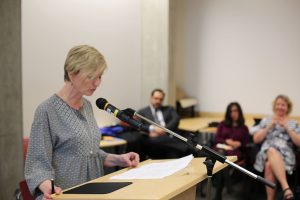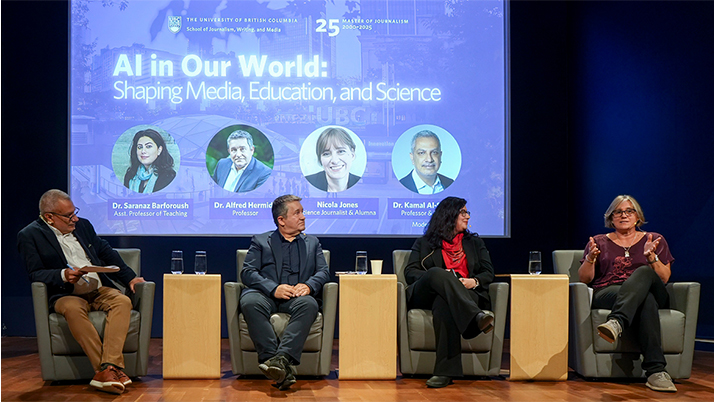

Professor Kathryn Gretsinger is joining other academics and journalists in a week of talks at the University of British Columbia on engaging with the media on health issues, with a focus on mental health.
The series, called Scholars Go Public, runs from July 4 to July 9 at the Irving K. Barber Learning Centre at the UBC Vancouver campus. Faculty and experts come from the fields of medicine, community planning, psychology, and journalism.
Gretsinger, who is lead instructor of Integrated Journalism and internship coordinator, brings a unique perspective and knowledge base to the panel. She became interested in how mental illness affects people when she reported on a story on deinstitutionalization years ago.
“The so-called ‘media’—a catch-all I reject as it lacks meaning and specificity—coverage has evolved over the years, but there are still problematic issues around coverage,” said Gretsinger. “Even basic understandings of mental illness that ought to improve. I try to address these things in class and in my community work.”
Gretsinger was invited to speak at the series by co-hosts Michelle Stack of the UBC Department of Educational Studies and Genevieve Creighton, a research associate at the UBC Department of Pediatrics. They are working with educators and journalists to find the best way to present complex public policy issues to policymakers and the media.
“We chose people based on their experience, and their experience working with graduate students,” said Stack. “Kathryn is one of these great panellists – someone who is known for being a really good educator, someone who would be supportive but also really critical.”
The series kicks off on July 4 at 4 p.m. with a panel on the reporting of mental issue that includes Professor Minelle Mahtani, a member of the School of Journalism’s advisory board.
Changing journalism
Gretsinger said she loves to “pull back the academic veil” and talk to the public about the teaching that takes place at the School of Journalism.
“Journalism practices are changing as a result of technology and a desire for more representative journalism. Increasingly, we’re considering questions about race and identity and gender and exploring power dynamics and wondering about privilege and agency,” she says.
Gretsinger will talk about what she’s learned from students, from challenging practices and standards in journalism, to those ideas still being reinforced.
“I am encouraged that [our journalism] students are not satisfied with the status quo,” she says. “They want to see change and they understand journalism—solid, public service journalism—is one way to make that change.”
Gretsinger is due to speak on July 7 from 9:30 to 10:45 a.m. along with Dr. David Kuhl from the UBC Faculty of Medicine.


